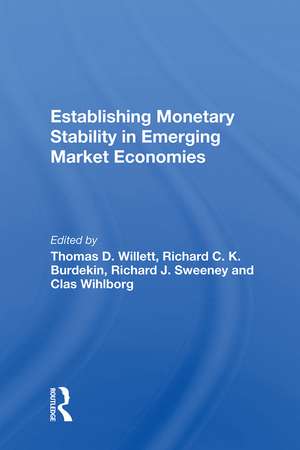Establishing Monetary Stability In Emerging Market Economies
Editat de Thomas D. Willetten Limba Engleză Hardback – 7 iun 2019
Preț: 764.20 lei
Preț vechi: 1027.40 lei
-26% Nou
Puncte Express: 1146
Preț estimativ în valută:
146.23€ • 150.86$ • 122.03£
146.23€ • 150.86$ • 122.03£
Carte tipărită la comandă
Livrare economică 26 martie-09 aprilie
Preluare comenzi: 021 569.72.76
Specificații
ISBN-13: 9780367017002
ISBN-10: 0367017008
Pagini: 280
Dimensiuni: 152 x 229 mm
Greutate: 0.45 kg
Ediția:1
Editura: Taylor & Francis
Colecția Routledge
Locul publicării:Oxford, United Kingdom
ISBN-10: 0367017008
Pagini: 280
Dimensiuni: 152 x 229 mm
Greutate: 0.45 kg
Ediția:1
Editura: Taylor & Francis
Colecția Routledge
Locul publicării:Oxford, United Kingdom
Descriere
There has been fierce debate about the optimal sequencing of economic reforms in emerging market economies. Many economists argue that for market-oriented systems to operate effectively, a reasonable degree of monetary stability is necessary. Rampant inflation, a common challenge for emerging economies, greatly reduces the chances that market-oriented reforms will be successful. In this comprehensive volume, a group of policy-oriented economists from North America, Europe, and the former Soviet Union explore the causes of monetary instability in reforming economies and evaluate alternative institutional mechanisms designed to reduce inflationary pressures. Considering the latest theoretical and empirical research–as well as the experiences of former Communist countries, including Russia and the erstwhile Soviet republics–the contributors view inflation as a political issue and make a case for the creation of strong political institutions. They argue that although government actions that stimulate inflation tend to have low costs or even benefits in the sort run, they impose heavy costs on the economy in the longer term. Consequently, there is a strong need to develop institutional mechanisms to help ensure that decision makers place appropriate emphasis on the long-run consequences of policy actions.
